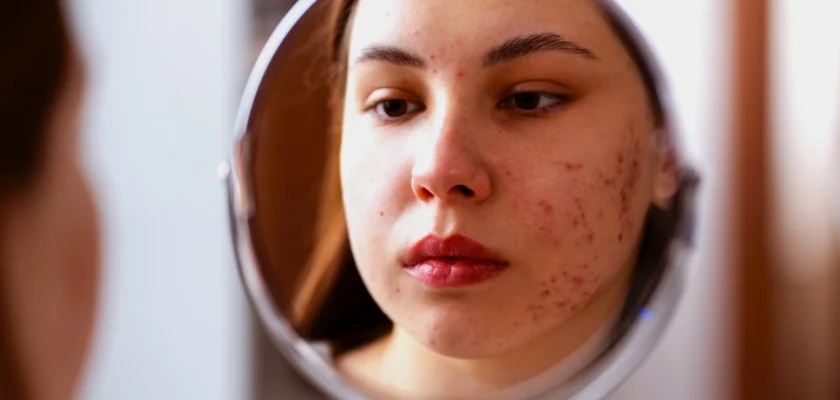To better understand how to prevent and detect skin diseases, it is important to know the common types of skin diseases. That’s why, in this article, we will discuss the different types of skin diseases, how to prevent them, and the importance of early detection.
Types of Skin Diseases
Numerous skin diseases affect people all over the world. Some are temporary while others can be chronic. Below are some of the most common types of skin diseases:
Acne
Acne is a common skin condition caused by the overproduction of oil by glands in the skin. It can appear as whiteheads, blackheads, or pimples and is most commonly found on the face, neck, chest, and back. Acne often starts during puberty but can also affect adults.
Eczema
Eczema is a chronic skin condition that causes redness, itching, and inflammation of the skin. It can appear in patches on different parts of the body and is often triggered by allergens, irritants, stress, or weather changes.
Psoriasis
Psoriasis is a chronic autoimmune disease that causes red, scaly patches on the skin. It occurs when the immune system mistakenly attacks healthy skin cells, causing them to multiply at an abnormally fast rate. Psoriasis can affect any part of the body, including the scalp, nails, and joints.
Read More – How to Achieve Dark Spot-Free Skin: From Dull to Dazzling
Skin Cancer
Skin cancer is the most common type of cancer in the world. It occurs when there is an abnormal growth of skin cells due to damage from UV radiation. The three main types of skin cancer are basal cell carcinoma, squamous cell carcinoma, and melanoma.
How to Prevent Skin Diseases
While some skin diseases cannot be prevented, there are steps you can take to reduce your risk of developing them. These include:
Use Sun Protection
UV radiation is one of the leading causes of skin cancer and can also contribute to premature aging, wrinkles, and sunspots. To protect your skin from the sun’s harmful rays, use sunscreen with SPF 30 or higher, wear protective clothing, and avoid direct sunlight between 10 am and 4 pm.
Keep Your Skin Clean
Keeping your skin clean can help prevent acne and other skin infections. Use a gentle cleanser to wash your face twice a day, and don’t forget to remove makeup before going to bed.
Moisturize
Moisturizing helps keep your skin hydrated, preventing dryness and cracking which can lead to eczema flare-ups. Use a moisturizer suitable for your skin type, and avoid products with harsh chemicals.
Importance of Early Detection
Early detection is crucial for the successful treatment of many skin diseases, including skin cancer. That’s why it is essential to visit a dermatologist regularly, especially if you notice any changes in your skin.
In Midvale, several experienced dermatologists can help diagnose and treat various skin conditions. They can also provide valuable information on how to properly care for your skin and prevent future issues.
In addition to regular check-ups, it is crucial to pay attention to any changes in your skin’s appearance. This includes new or changing moles, sores that won’t heal, and unusual bumps or growths. If you notice these symptoms, seek medical attention immediately.
Conclusion
Taking care of your skin is essential for both its health and appearance. By understanding the different types of skin diseases, how to prevent them, and the importance of early detection, you can maintain healthy and radiant skin.
Remember to always protect yourself from the sun’s harmful rays, keep your skin clean and moisturized, and seek medical attention for any concerning changes in your skin. Your skin deserves proper care and attention, so make sure to prioritize its health for a happier and healthier you.

